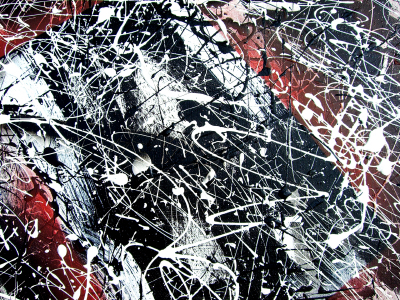Wednesday 09th December 2015

A group of paintings supposedly by the famed Abstract Expressionist artist Jackson Pollock are under close review by a team of experts after doubts were raised about the authenticity of the pieces. A whopping 30 paintings were being examined by UK-based Art Analysis & Research, an authentication firm that specializes in the forensic analysis of artwork. Of the larger group, 12 were found to use a paint pigment that wasn't commercially available before Pollock's untimely death in 1956.
The pigment in question, CI Pigment Yellow 74, could possibly have been used another way, but it creates an awkward situation for the Nevada gallery Classic Fine Art, which exhibited 6 of the paintings in question this past July at the Art Monaco fair. That wasn't the first time the works have been displayed, either - they have appeared variously at the University of California, Berkeley, and the Museum of Biblical Art in Dallas. Beyond the pigment problems, the provenance of the entire batch of 30 is thrown into question by a rather sketchy backstory filled with anonymous donors and suspiciously low prices.
The reports on the works in question by Art Analysis & Research are very specific: "The earliest forms of this class of pigment appeared on the commercial market in 1910 (PY1), with others following in the 1920s (such as PY4-6). However, the date of introduction of PY74 is commonly given in the literature as 1957. This consequently raises a number of issues."
They go on to suggest that more testing be done, and include the conjecture that it is possible that the manufacturers provided Pollock with a number of pigments before they were more generally commercially available, but it seems somewhat unlikely that this would have happened without any sort of record of the exchange taking place, either in Pollock's notes or correspondence, or the company's papers - surely it would have been quite a marketing coup to have a popular artist working with and testing new paint compositions.
Classic Fine Art leaves with a final word on the matter: “We will stand by the results, whatever they are.” Kudos to them for bearing up remarkably well under a bad situation, but here's hoping they haven't been duped. The world can always use more beautiful art, and unfortunately Pollock won't be making any more himself.
Posted on December 09th 2015 on 04:25pm
 A group of paintings supposedly by the famed Abstract Expressionist artist Jackson Pollock are under close review by a team of experts after doubts were raised about the authenticity of the pieces. A whopping 30 paintings were being examined by UK-based Art Analysis & Research, an authentication firm that specializes in the forensic analysis of artwork. Of the larger group, 12 were found to use a paint pigment that wasn't commercially available before Pollock's untimely death in 1956.
A group of paintings supposedly by the famed Abstract Expressionist artist Jackson Pollock are under close review by a team of experts after doubts were raised about the authenticity of the pieces. A whopping 30 paintings were being examined by UK-based Art Analysis & Research, an authentication firm that specializes in the forensic analysis of artwork. Of the larger group, 12 were found to use a paint pigment that wasn't commercially available before Pollock's untimely death in 1956.



